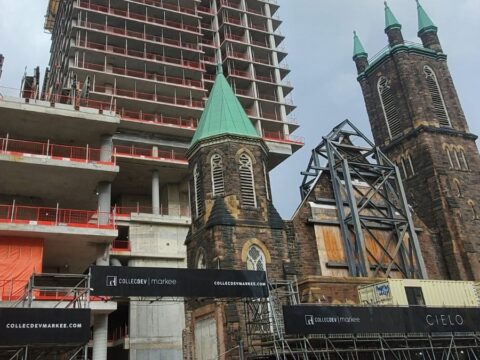All charities have come under closer scrutiny by the Canada Revenue Agency in the past two years. But tax collectors and charity officials have been looking very closely at The United Church of Canada, examining the denomination’s books three times last year, with another audit planned this year. Visiting tax officials even read a former moderator’s e-mails.
While church officials don’t say the denomination has been targeted because of its stances on environmental or justice issues, they are having to deal with the government’s recent enthusiasm for enforcing the rules around the types of political activity allowable for charities. And where government definitions of “political activity” bump up against church practices, there could be renewed discussion over the intersection of religious beliefs and political action.
You may unsubscribe from any of our newsletters at any time.
This spring, while awaiting a report on last September’s audit by the CRA Charities Directorate, the church’s General Council Office was also bracing for a followup to a Harmonized Sales Tax audit it passed last year along with a payroll audit.
HST and payroll audits deal with relatively mundane issues relating to tax credits and payroll deductions. But Charities Directorate visits were part of an initiative by the federal tax agency to take a closer look at political activity.
The program — intended to help root out foreign funding of Canadian environmental charities and Canadian charities’ funding of global terrorism, says the federal government — began in 2012 when the federal budget earmarked $8 million in extra CRA funding. It’s expected to continue, with ongoing funding, beyond 2017.
With the right to issue charitable tax receipts at stake, all charities are paying close attention.
Aside from the United Church, only one other member of the 25-member Canadian Council of Churches — the Evangelical Lutheran Church in Canada — is currently facing a similar Charities Directorate audit. The Evangelical Fellowship of Canada hasn’t heard of recent increases in audits among its affiliated 40 denominations or 1,000 congregations. Nor has the 3,200-member Canadian Council of Christian Charities.
But earlier this year, seven high-profile charities focused on the environment also reported being audited for political activity. Some of them believe it’s because they oppose the current federal government’s positions on various environmental issues.
Perhaps ironically, the rules on political activities by charities are 11 years old and based on a detailed policy that was worked out under the previous Liberal government, after extensive consultations with charities. The 2012 initiative brought increased enforcement but only one small policy change on financial transfers for funding political activities.
About one percent of Canada’s 86,000 registered charities are audited every year, and the CRA says they are chosen at random, or following up on complaints, possible non-compliance or information in their returns.
“I continue to say we were due for audit activity,” says General Council’s chief financial officer, Erik Mathiesen. “But it does feel like a lot.”
Unlike secular charities, the United Church is made up of 2,182 pastoral charges, 85 Presbyteries or districts, 13 Conferences and various related ministries, each with its own charitable number.
To keep charitable status, all must file annual T-3010 forms outlining income, activities and spending. Organizations indicating political activity now have to fill out a Schedule 7 form detailing activities and resources that were used. Activities could include letter writing, rallies and Internet postings. Resources must be identified as staff, volunteers, finances or property.
Mathiesen has been holding webinars, sending information to pastoral charges and referring them to the CRA website; it’s packed with written information, videos and webinars. But after years with little or no enforcement of the political activity policy, the learning curve may be steep.
Rev. John Pellowe, CEO of the Canadian Council of Christian Charities, says, “Some people think the CRA has it in for Christian churches, because they seem to get audited disproportionately.”
However, churches “do things that trip red flags.” Aside from political activities, many churches have overseas missions, as well as related businesses like coffee shops, bookstores or parking lots.
Pellowe, who works closely with the Charities Directorate, says the agency is “sincerely interested in the welfare of the charitable sector.” To its credit, the directorate’s Charities Listings webpage now offers easy public access to any registered charity’s financial records, with a breakdown on spending — including political activity.
So what is charitable activity, acceptable political activity and forbidden political activity? Some distinctions are clear, but others are more subtle.
For starters, the CRA states that all charities have to devote “substantially all” of their resources to their charitable purpose. In practice, that’s defined as 90 percent, allowing up to 10 percent for acceptable political activity in areas connected to their charity’s purpose. Political activity also has to be “subordinate” to charitable activity and can’t overtake the charitable activity in importance.
Partisan political activity that favours or supports one political party over another is always forbidden.
At any time, though, charities and churches may approach government officials or elected representatives directly on a non-partisan basis to make suggestions on matters of policy or law related to their charitable purpose and activity. If the concerns are part of a church or charity’s mission, those approaches are part of their charitable activity and not political.
When a Canadian Council of Churches’ delegation made its annual visit to Parliament Hill early in May, for example, it was well within its charitable mission when speaking directly with the Prime Minister’s Office, all party leaders and various government departments on church-related concerns about human trafficking, climate justice and religious freedom.
“For the good of the country, one does need to be in conversation with all parties and leaders,” says Rev. Karen Hamilton, general secretary of the CCC.
Public calls for action, however, are allowable but always political. Tax policy says an activity becomes political when it “encourages the public to contact an elected representative or public official and urges them to retain, oppose, or change the law, policy, or decision of any level of government in Canada or a foreign country.” Publicly communicating such calls to action or doing anything to “incite, or organize to put pressure on” government officials or elected representatives is also political.
KAIROS Canada, a coalition of the United Church and 10 other churches or religious organizations dedicated to “faithful action for ecological justice and human rights,” works in a grey area that clearly includes charitable and political activities.
“Reflecting on our faith, . . . KAIROS, with our churches, engages in the public sphere in many ways,” says executive director Jennifer Henry. “None of that is partisan. Very little is included in the CRA’s definition of ‘political activity,’ leaving the vast majority of our work defined as charitable.”
In its 2012 year-end report, The United Church of Canada had political activity adding up to $918,450, or about two percent of overall spending of $53 million. By comparison, the General Synod of the Anglican Church of Canada, the Presbyterian Church in Canada, the Canadian Conference of Catholic Bishops, the Evangelical Lutheran Church in Canada and the Salvation Army in Canada listed no spending on political activities.
The Evangelical Fellowship of Canada also reports spending about two percent, or $83,150 of its $3.5 million in annual expenditures, on political activity. According to its website, being “a positive contributor to public policy” is one of its roles. Fostering “discussion on the application of biblical principles to contemporary issues” is one way it does that.
EFC president Bruce Clemenger, one of Canada’s most seasoned hands at government-church relations, says Christian “norms and principles . . . speak to the common good of society” and should help inform governments. If that means political activity, he says churches have to heed CRA rules and “be sure we don’t stray from what we are intended to do as charities.”
During the General Council Office’s recent audit, says Mathiesen, his tally of political activity in 2012 included most of the salaries of staff working on “public witness,” including letter-writing campaigns or petition signing. He says much of the salary of then moderator Mardi Tindal — who regularly called on the Canadian government to stand behind its environmental commitments — was also included.
Background material for auditors included brochures, information handouts and monthly time sheets from justice coalition KAIROS Canada — for whom the United Church issues charitable receipts — indicating political activity levels. Officials also had access to General Council correspondence, including Tindal’s e-mails, as part of standard auditing procedure.
Mathiesen advises church people claiming political activity “to err on the high side. If you are audited, it’s better to say, ‘I rounded up just in case.’”
Other parts of the church, though, are still struggling to understand, identify and report political activity. In an era of website links, Facebook postings and tweeting — and in a church with a tradition of supporting petitions, rallies and letter-writing campaigns — it’s not easy.
For pastoral charges, just getting reminders on political activity reporting from the CRA’s online news feed can discourage comments or activity that could be seen as political. “It has a chilling effect in an area where a lot of people have trouble speaking anyway,” says Rev. Dick Prince, minister at St. Paul’s United in Warkworth, Ont.
Other church courts may not feel chilled but have received warning letters from the Charities Directorate. The CRA recently called to task both Maritime Conference and Manitoba and Northwestern Ontario Conference for failing to report public calls for political action posted to their Conference websites.
For MNWO, these were letter-writing campaigns on poverty and peace, plus calls for fair treatment of refugees. Maritime Conference’s website asked people to contact elected representatives on fracking and related protests.
In reminder letters, the CRA said it was satisfied Conferences were operating within their political activity limits, but future non-compliance could lead to the suspension of the authority to issue official donation receipts.
MNWO Conference executive secretary Rev. Shannon McCarthy says the letter showed her that “my definition of political activity and the CRA’s definition of political activity are further apart than I thought they were.”
Maritime Conference executive secretary David Hewitt called the CRA letter a “kind” reminder that Conference needs to be “more intentional” in its reporting. But Hewitt also says the CRA’s increased focus on political activity could raise broader questions.
“If our religious activity is to be constrained by the government, according to this definition [of political activity], then maybe the church needs to say something,” he says. “And not alone, but with other Canadian faith groups that may be under some risk, according to the same definition.”
***
This story first appeared in The United Church Observer’s July/August 2014 issue with the title “The auditors come knocking.”













